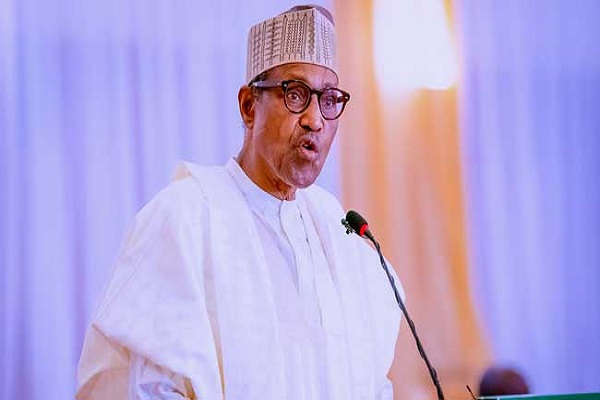National
Buhari: Investment in youths is a catalyst for economic development.

Ibekimi Oriamaja Reports
President Muhammadu Buhari has proposed a number of strategies, including increased investment in the youth sector, to put Nigeria on a path of steady growth and a stable economic outlook.
The President spoke yesterday at the start of this year’s National Economic Summit in Abuja, emphasizing the importance of partnerships, innovative thinking, and disciplined implementation by both government and the private sector in moving the country forward.
The president, who was represented by Vice President Yemi Osinbajo, also emphasized the need for increased productivity and value addition across various sectors of the economy in order to create more jobs for Nigerians, particularly its youths, and increase national revenue for further development.
The Presidential address focused on key issues to drive growth and prosperity, such as the National Development Plan 2021-2025 and the impact of the Economic Sustainability Plan, among others, on the Summit’s theme of “2023 & Beyond: Priorities for Shared Prosperity.”
The President’s speech focused on key issues such as youth development, improving macroeconomic conditions, the impact of climate change, the need for a just transition to net-zero emissions, a debt-for-climate swap agreement for African countries, and the launch of the African Carbon Market Initiative at the ongoing COP-27 in Egypt.
It also emphasized the importance of leveraging disruptive technologies such as digitization for further economic development, as well as the need to improve social welfare programs and invest in the country’s youth.
Osinbajo stated in a statement issued by Senior Special Assistant to the President on Media and Publicity, Office of the Vice President, Mr Laolu Akande, “the need for more intentional and focused investment on our youths, particularly in globally marketable skills, access to credit, protection of innovators’ and inventors’ intellectual property rights, and access to global markets.” I am confident that some of these issues will receive more attention during your summit discussions.
“The task ahead requires collaboration, innovative thinking, and, most importantly, disciplined execution,” he said.
The Vice President emphasized improved macroeconomic conditions, saying, “on the positive side, the economy continues to grow, with GDP growth at 3.54% in the second quarter of this year.” Non-oil revenues have also continued to rise, thanks in part to strategic revenue initiatives such as the annual Finance Act.”
“However, it is our revenue challenges that heighten the perception that we have a debt problem, which is simply not the case, given that our debt/GDP ratio is only 2%.”
Despite the country’s high current debt service to revenue ratio, Prof. Osinbajo stated that “unlike in the past, when we were not keeping a close eye on debt matters, the creation of the Debt Management Office means that we are better able to adopt debt management strategies, such as using more concessional loans, spreading our debt maturities, and re-financing short-term debt with longer-term debt instruments.”
As a result, he believes that increasing revenues should receive the majority of attention.
“We have already seen significant increases in non-oil revenues, but our focus must now shift to productivity or encouraging value addition.” Productivity and value addition imply the creation of traceable value, which translates into jobs, opportunities, and increased tax revenues.”
“To increase productivity, we must free up our environment for business, make local and international trade easier by fixing the ports, implementing the National Single Window, redesigning our Customs processes and Tariff codes to reduce delays and arbitrariness, and removing unnecessary restrictions on imports to enable value added processes,” he continued.
Similarly, Prof. Osinbajo emphasized that Nigeria must capitalize on its renewable energy advantage, noting that “the future are the jobs and opportunities from the green economy.”
The VP stated that the “Solar Power Naija” program, which was launched under the Economic Sustainability Plan and aims to connect 5 million Nigerians to solar power, will help in this regard. However, the impact includes opportunities in the manufacture and maintenance of solar equipment and facilities.”
He also mentioned local security and economic challenges, as well as global turbulence on the political, economic, and social fronts, such as the Russia-Ukraine war and global tensions, which he said are “impacting Africa, including through higher food prices and disruptions to democratic governance.”
With the global economy still recovering from the effects of COVID-19, as well as the challenges posed by climate change, which has caused flooding in several Nigerian states, the Vice President stated, “it is clear that our work is cut out for us, and we must choose our priorities going forward very carefully.” There are numerous issues that require our attention, many of which are well addressed in the National Development Plan 2021-2025.”
-

 Politics3 days ago
Politics3 days ago$35M Atlantic Refinery Project: Sunny Goli Commend Tinubu, EFCC over Diligent Prosecution
-

 Politics3 days ago
Politics3 days agoAlleged N101.4 Billion Fraud: Court Orders Service of Hearing Notice on Yahaya Bello
-

 Politics3 days ago
Politics3 days agoConfusion As Court Adjourns Appeals On Rivers State Political Crisis, Orders PDP To Clarify Legal Representation
-

 Politics3 days ago
Politics3 days agoEdo State Govt Bans Activities Of Drivers On Wheels And Road Transport Employees Association Of Nigeria (RTEAN).
-

 News3 days ago
News3 days agoKAI demolishes 138 Shanties, dislodges 169 illegal residents in Lagos
-

 Niger Delta6 days ago
Niger Delta6 days agoPAP Has Been Beneficial But Budget Increment Is Long Overdue—Ex- Agitator
-

 Politics6 days ago
Politics6 days agoAppeal Court President Sets Up Special Panel to Address Rivers State Political Crisis
-

 News3 days ago
News3 days agoPolice Cracks Down Criminal Syndicates, Apprehend 82 suspects in Kano




